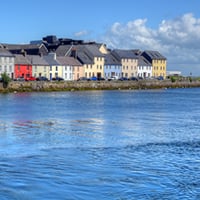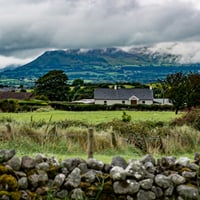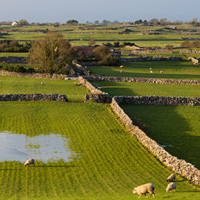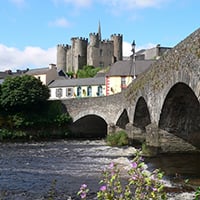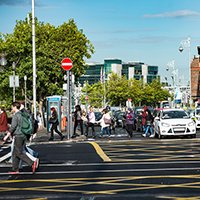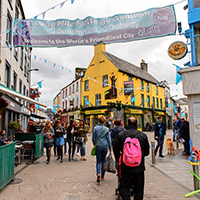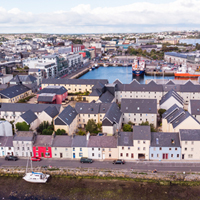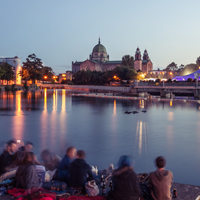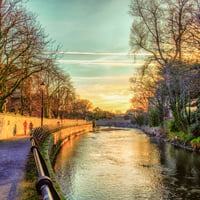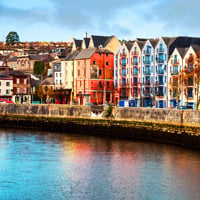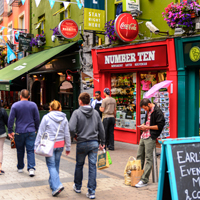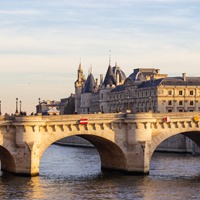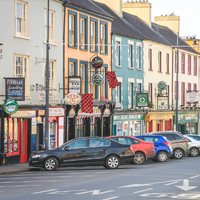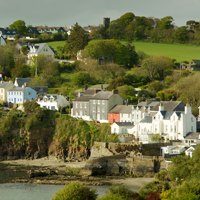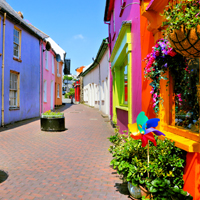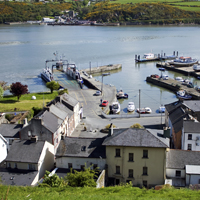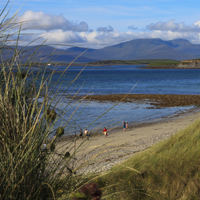Ireland
Coastal BeachesIreland, known as the Emerald Isle due to its lush greenery and rolling hills, is a country steeped in rich history and culture. Located to the northwest of continental Europe, it is the third-largest island in Europe and the twentieth-largest on Earth. Ireland is politically divided between the Republic of Ireland, which covers five-sixths of the island, and Northern Ireland, a part of the United Kingdom. The country's landscape is characterized by a mix of flat plains and rugged Atlantic coastline, with numerous cliffs and sandy beaches. The River Shannon, the longest river in Ireland, flows through its lush countryside. The climate in Ireland is typically maritime with mild winters, cool summers, and a lack of temperature extremes. The Irish culture is known for its contributions to literature, music, and dance, with the country producing several Nobel laureates in literature. Dublin, the capital city, is the birthplace of writers like James Joyce and W.B. Yeats. Ireland's economy is modern and trade-dependent with growth averaging a robust 7% from 1995-2007. However, the global financial crisis in 2008 impacted the economy significantly, leading to a period of economic adjustment. The country has since recovered and is known for its high standard of living, with a strong presence of multinational corporations, particularly in the technology and pharmaceutical sectors. The Irish are known for their friendliness and hospitality, contributing to Ireland's reputation as a welcoming country. The nation has a rich heritage of folklore and traditions, such as the celebration of St. Patrick's Day. Ireland's pub culture is also a central aspect of social life, with traditional music often played live in pubs across the country. Tourism is a significant industry in Ireland, with the country's natural beauty, historic castles, and cultural experiences attracting visitors from around the world. The Cliffs of Moher, Ring of Kerry, and the Giant's Causeway in Northern Ireland are just a few of the natural wonders that Ireland has to offer. The country's history is also a draw, with ancient sites like the prehistoric Newgrange and the medieval Rock of Cashel. Despite its small size, Ireland has made a substantial impact on the global stage, both culturally and economically, and continues to maintain a unique and influential presence in Europe and beyond.
 CORNERSTONE Relocation
CORNERSTONE RelocationConnect
Home finding, schooling, moving, settling-in and more for UK, London and Ireland. Cornerstone is a tech-driven, innovative relocation company. Making relocating to London, UK, Ireland and beyond a happy experience!
Click connect to have our partner contact you via e-mail and/or phone.
 CORNERSTONE Relocation
CORNERSTONE RelocationHome finding, schooling, moving, settling-in and more for UK, London and Ireland. Cornerstone is a tech-driven, innovative relocation company. Making relocating to London, UK, Ireland and beyond a happy experience!
Connect
Click connect to have our partner contact you via e-mail and/or phone.
Living in Ireland
Best Places to Live in Ireland
Visa & Residency
Obtaining a residency in Ireland involves navigating through a structured system that caters to various types of residents, ranging from students and professionals to retirees and family members. The process can be considered average in terms of difficulty, but it requires careful attention to detail and adherence to the specific requirements of the chosen visa category. One of the most popular visas for expats is the Critical Skills Employment Permit, which is designed for individuals with skills that are deemed critical to the Irish economy. This visa is attractive because it offers a path to long-term residency and eventual citizenship. To obtain this permit, an applicant must have a job offer with a minimum annual salary threshold, depending on the occupation. The employer must also demonstrate that the position could not be filled by an EU/EEA or Swiss national. Another common option is the General Employment Permit, which is available for a broader range of occupations but still requires a job offer and proof that the position cannot be filled from within the EU/EEA. Both employment permits require the employer to initiate the application process. For those not looking to work in Ireland, the Stamp 0 visa is an option. This visa is suitable for retirees or those with independent means who wish to live in Ireland without working or starting a business. Applicants must prove they have sufficient resources to support themselves and will not become a burden to the state. Digital nomads often use this visa as it allows them to reside in Ireland while working remotely for a company or clients outside the country. The application process for residency visas typically involves submitting detailed documentation, including proof of qualifications, financial resources, health insurance, and background checks. Applicants may also need to provide biometric information and attend an interview. The processing time for visas can vary, but applicants can generally expect a decision within a few months. It is important to note that immigration policies and procedures can change, so staying informed about the latest requirements is crucial for a successful application.
Healthcare in Ireland
The healthcare system in Ireland is a mix of public and private services. The public healthcare system is managed by the Health Service Executive (HSE) and is funded by general taxation. All residents of Ireland are entitled to receive healthcare through the public healthcare system, which provides a range of services either free of charge or at a subsidized cost. However, waiting times for public healthcare services can be long, and as a result, some people opt for private healthcare to get faster access to treatment. Private healthcare usually offers more immediate access to services but at a higher cost. The quality of healthcare in Ireland is generally considered to be good, with well-trained medical staff and modern facilities. Expats and digital nomads who are legal residents in Ireland and make the necessary social insurance contributions are eligible for the same healthcare benefits as Irish citizens. Non-residents can access healthcare services but will likely need private health insurance to cover the costs.
Cost of Living
The cost of living in Ireland is considered high, with Dublin often ranking as one of the most expensive cities in Europe. Housing, in particular, can be quite costly, and the overall expenses for goods and services are generally above the European average.
Weather
Ireland has a temperate maritime climate, characterized by mild, moist weather with abundant rainfall and a lack of temperature extremes. Winters are generally cool, while summers are mild. The Atlantic Ocean influences the weather, often bringing cloud cover and rain.
Educational System in Ireland
The educational system in Ireland is highly regarded and offers a comprehensive structure for students from early childhood to secondary level. Education is compulsory for children aged 6 to 16 or until students have completed three years of second-level education. The system is divided into primary, secondary, and tertiary levels. Primary education typically starts at the age of 4 or 5 and continues until the age of 12 or 13, consisting of eight years: junior infants, senior infants, and first through sixth class. Secondary education is divided into a three-year junior cycle followed by a two or three-year senior cycle, depending on whether the optional Transition Year is taken. The junior cycle culminates in the Junior Certificate examination, while the senior cycle leads to the Leaving Certificate, which is necessary for university entry. Irish schools are known for their support of cultural activities, sports, and language development, with Irish (Gaelic) taught in all schools alongside English. The quality of education is high, with a strong emphasis on preparing students for higher education and vocational training.
Copyright 1997-2025 Burlingame Interactive, Inc.

